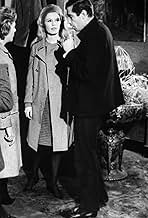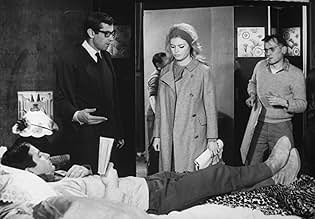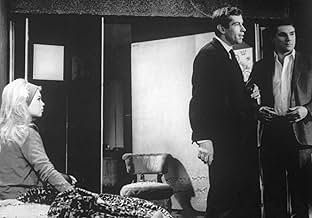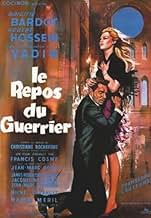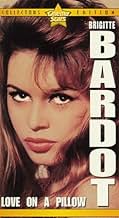Une jeune fille sauve un homme d'une tentative de suicide. Il s'avère être un sociopathe, qui commence à prendre le contrôle de sa vie, la maltraitant verbalement et émotionnellement, mais e... Tout lireUne jeune fille sauve un homme d'une tentative de suicide. Il s'avère être un sociopathe, qui commence à prendre le contrôle de sa vie, la maltraitant verbalement et émotionnellement, mais elle ne semble pas pouvoir se détacher de lui.Une jeune fille sauve un homme d'une tentative de suicide. Il s'avère être un sociopathe, qui commence à prendre le contrôle de sa vie, la maltraitant verbalement et émotionnellement, mais elle ne semble pas pouvoir se détacher de lui.
- Réalisation
- Scénario
- Casting principal
- Raphaële
- (as Macha Meril)
- Katov
- (voix)
- Le patron de l'hôtel
- (non crédité)
- Madame Pia - la concierge
- (non crédité)
- Armand
- (non crédité)
- Le gros serveur
- (non crédité)
- Le vieil homme dans le train
- (non crédité)
Avis à la une
All this, however, serves to make him even more miserable, in the best masochistic tradition, as he falls even more deeply into his alcoholic albatross, rather than face real life responsibility as a sober, productive man with a good woman by his side.
Bardot exudes the utmost maturity and restraint in taking the best cheap shots this ungrateful con-artist, female user, and abusive man (Robert Hossein, in an outstanding interpretation of a difficult role) can dump on her. The problem here is universal in scope in that it portrays two people who are physically attracted to each other, to the point of addiction, while at the same time a classic mis-match from a values and a psychological perspective. "You always hurt the one you love," was never more in evidence than for the 102 emotion-draining minutes of this film. Clearly a Vadim masterpiece, and a triumphant collaboration with Bardot, long after their real-life divorce and her remarriage. This represents "professionalism" to the highest degree.
Today, seeing the film again, I found it almost stupid. I explain.
1. The revolt of Renaud is not explained in a context, so we don't know exactly why he is bitter, cynic, self destructive and iconoclast.
2. The author of the story tries to glamorize Renaud revolt, but, what I see can't be glamorized. For instance, Renaud wears the same unwashed clothes during several weeks (which seems to be the time the story lasts) doesn't take a bath and doens't shave his beard. He smokes all the time and drinks heavily since the time he wakes up. So, his clothes and his breath certainly stink disgustingly. He messes seriously Geneviève's apartment spreading all around dirty dishes and ash trays stuffed with smoked cigarettes. All this mess and dirtiness for nothing... or to punish unjustly Geneviève?
3. Geneviève looks rather as stupid blonde female because she falls in love with a stinking revolted pseudo-existentialist who does't do anything useful to anyone and criticize hardly the middle class life style, middle class of which he is actually a parasite.
The film deserves to be seen because of the presence of BB. She was marvelous by that time and a real icon of a generation. A queen of many dreamers as me.
"Le Repôs du Guerrier" has a great premise a conservative woman falling in love for a destructive man that corrupts her in a masochist relationship. The story is long, disclosing many abusive and humiliating situations that Geneviève is exposed in an erotic way, considering that this is a movie of 1962. For example, the orgy in Katov's apartment is not explicit but it is very clear that the participants are having sex, using drugs and drinking booze. However, Roger Vadim's option for a corny conclusion gives the sensation of a melodramatic soap-opera and spoils the dramatic and crude romance. My vote is four.
Title (Brazil): "O Repouso do Guerreiro" ("The Warrior's Rest")
However, I detected one scene that may unite appreciators and non-appreciators. Its jazz-tune, somewhere halfway this movie, really is very good.
All in all a movie with an unususal thin story, even for Bardot-standards. That may be inspired by the Italian Fellini/Antonioni-movies, whcih were very fashionable in 1962. If 'repos' provides us with any theme, it's about the battle of the sexes. Brigitte comes out victorious: a foregone conclusion, given the nitwit-character of her male counterpart.
Le saviez-vous
- AnecdotesThe encore for this film, composed by Michel Magne, was later used in 1968 by Frida Boccara in her single "Cent Mille Chansons". This version, now with lyrics, was written by Eddy Marnay.
- Citations
Renaud Sarti: Our lives on this earth are pointless.
Geneviève Le Theil: Speak for yourself.
Renaud Sarti: I am.
- ConnexionsFeatured in Le mystère Bardot (2012)
Meilleurs choix
- How long is Love on a Pillow?Alimenté par Alexa
Détails
- Durée1 heure 42 minutes
- Rapport de forme
- 2.35 : 1
Contribuer à cette page



